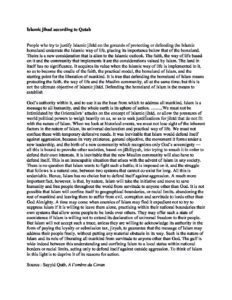People who try to justify Islamic jihād on the grounds of protecting or defending the Islamic homeland underrate the Islamic way of life, placing its importance below that of the homeland. Theirs is a new consideration that is alien to the Islamic outlook. The faith, the way of life based on it and the community that implements it are the considerations valued by Islam. The land in itself has no significance. It acquires its value when the Islamic way of life is implemented in it, so as to become the cradle of the faith, the practical model, the homeland of Islam, and the starting point for the liberation of mankind. It is true that defending the homeland of Islam means protecting the faith, the way of life and the Muslim community, all at the same time; but this is not the ultimate objective of Islamic jihād. Defending the homeland of Islam is the means to establish
God’s authority within it, and to use it as the base from which to address all mankind. Islam is a message to all humanity, and the whole earth is its sphere of action. ……..We must not be intimidated by the Orientalists’ attacks on the concept of Islamic jihād, or allow the pressures of world political powers to weigh heavily on us, so as to seek justifications for jihād that do not fit with the nature of Islam. When we look at historical events, we must not lose sight of the inherent factors in the nature of Islam, its universal declaration and practical way of life. We must not confuse these with temporary defensive needs. It was inevitable that Islam would defend itself against aggression, because its very existence, general objective, the movement it forms under a new leadership, and the birth of a new community which recognizes only God’s sovereignty — all this is bound to provoke other societies, based on jāhiliyyah, into trying to smash it in order to defend their own interests. It is inevitable that the new Muslim community will also have to defend itself. This is an inescapable situation that arises with the advent of Islam in any society. There is no question that Islam wants to fight such a battle; it is imposed on it, and the struggle that follows is a natural one, between two systems that cannot co-exist for long. All this is undeniable. Hence, Islam has no choice but to defend itself against aggression. A much more important fact, however, is that, by nature, Islam will take the initiative and move to save humanity and free people throughout the world from servitude to anyone other than God. It is not possible that Islam will confine itself to geographical boundaries, or racial limits, abandoning the rest of mankind and leaving them to suffer from evil, corruption and servitude to lords other than God Almighty. A time may come when enemies of Islam may find it expedient not to try to suppress Islam if it is willing to leave them alone, practising within their national boundaries their own systems that allow some people to be lords over others. They may offer such a state of coexistence if Islam is willing not to extend its declaration of universal freedom to their people. But Islam will not accept such a truce, unless they are willing to acknowledge its authority in the form of paying the loyalty or submission tax, jizyah, to guarantee that the message of Islam may address their people freely, without putting any material obstacle in its way. Such is the nature of Islam and its role of liberating all mankind from servitude to anyone other than God. The gulf is wide indeed between this understanding and confining Islam to a local status within national borders or racial limits, acting only to defend itself against outside aggression. To think of Islam in this light is to deprive it of its reasons for action.
